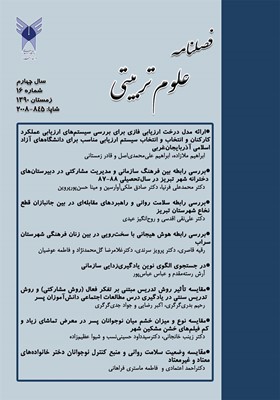In search of a modern Organizational unlearning model
Subject Areas : Educational Psychology
Arash Rasteh Moghadam
1
,
Abbas Abbaspour
2
![]()
1 - دانشجوی دکتری رشته مدیریت، دانشگاه علامه طباطبایی (ره)، تهران، ایران.
2 - دکترای مدیریت منابع انسانی، عضو هیئت علمی دانشگاه علامه طباطبایی (ره)، تهران، ایران.
Keywords: Organizational Learning, organizational unlearning, organizational forgetting,
Abstract :
In spite of the growing popularity of the terms “organizational learning (OL)” and “learning organization (LO)”, the concept of organizational unlearning (OUL) has generally been neglected. OUL is different from organizational learning disability or organizational forgetting. OUL is the process of intentional discarding of ineffective and obsolete organizational beliefs, routines and procedures. The main purpose of this study which has an analytical and inferential approach is to review the literature of OUL concept including the nature, content, levels and dimensions of OUL. Furthermore, the process of OUL has been explained by new OUN models. At last, the conceptual relation between OUL and OL has been proposed as an integrated model. The article ends with some applied and research suggestions.
Adli, F. (2010).Unlearning; strategy to learn more. Iranian Journal of Educational Strategies. Vol. 3, No. 1, Spring Pages: 17-21.
Akgün AE, Byrne JC, Lynn GS, Keskin H (2007). New product development in turbulent environments: Impact of improvisation and unlearning on new product performance. J. Eng. Technol. Manage., 24(3): 203-230.
Albert S, Vicenc F (2009). Organizational Forgetting in Higher Education. 3rd InternationalConference on Industrial Engineering and Industrial Management
Becker, KL. (2008). Unlearning in the workplace, A mixed methods study. Phd thesis.
Becker, KL, (2010). Facilitating unlearning during implementation of new technology. Journal of Organizational Change 23 (3), 251–268.
Chao L, Ya-Ling H, Ming J, der C, (2011). Relationships among unlearning, knowledge application, and new product development performance: Exploring the moderating effect of the information processing mechanism . African Journal of Business Management Vol. 5(13), pp. 5297-5310, 4 July,
De Holan, P M, Phiiips, N and Lawrence, T B (2004). “Managing Organizational Forgetting,” MIT Sloan Management Review, 45(2), 45-51.
Emre Y, Carl F.(2010). Compatibility and unlearning in knowledge transfer inmergers and acquisitions ScandinavianJournal of Management 26, 448—456.
Haji Azizi N, Dokht Esmati M, Moradi S, (2008). Organizational forgetting, a new approach in knowledge management, Journal of Science and Information Technology. Vol. 25, No. 2, p. 317-330.
Hedberg, B. (1981). How Organizations Learn and Unlearn. In P. Nystrom & W. H. Starbuck(Eds.), Handbook of Organizational Design (Vol. 1). London: CambridgeUniversity Press.
Hosseini , SY. Jalali, R. Khosravani, F. (2010). Organizational forgetting; a managerial challenge in the new workmanship Era. Transformational Management Journal, Vol. 2, No. 4,PP.98-117.
Les Tien-S.(2011). The effects of challenge and hindrance stressors onunlearning and NPD success: The moderating role of team conflict . African Journal of Business Management Vol.5 (5), pp. 1843-1856.
Maurizio PM. (2011). Unlearning/Relearning in Processesof Business Information Systems Innovation. Journal Of Information And Organizational Sciences, VOL. 35, NO. 1, PP. 59-72.
Moshabeki A, Rabiee M, (2007). Intentional organizational forgetting, the elixir of competitiveness in organizations. Journal of Human Sciences Modares, Vol. 13, No. 4,PP.194-218.
Srithika T M and Sanghamitra B. (2009). Facilitating OrganizationalUnlearning using Appreciative Inquiry as an Intervention vikalpa, Vol 34, No 4.PP.67-77.
Tsang, E. W. K., & Zahra, S. (2008). Organizational unlearning. Human Relations, 61(10), 1435—1462.
Windeknecht, K, Delahaye, B. (2004). A model of individual and organizational unlearning. In Proceedings 18th annual Conference of the Australian and New Zealand Academy of Management, Dunedin, NZ.
Wong, P.S.P., Cheung, S.O., Regina L.Y. Yiub and Mary Hardiec.,(2011) . The unlearning dimension of organizational learning in construction projects-International Journal of Project Management-13.pp.1-12.
Wong, P.S.P., Cheung, S.O., Fan, J.K.L.,(2009). Examining the relationship between organizational learning styles and project performance: a Structural Equation Modeling approach. Journal of Construction Engineering and Management, ASCE 135 (6), 497–507.
Wong, P.S.P., Cheung, S.O.,(2008). An analysis of the relationship between learning behaviour and performance improvement of the contracting organizations. The International Journal of Project Management 26 (2), 112–123.


